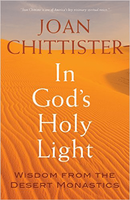Someone else to help us see
A brother questioned Abba Hierax saying, “Give me a Word. How can I be saved?” The old man said to him, “Sit in your cell, and if  you are hungry, eat. If you are thirsty, drink. Only do not speak evil of anyone, and you will be saved.”
you are hungry, eat. If you are thirsty, drink. Only do not speak evil of anyone, and you will be saved.”
To move beyond where we are in our rigid attitudes, our narrow perspectives on life, takes a fresh view of the spiritual terrain we’ve already traveled. The soul needs a guide to navigate these deep waters. A good friend, a spiritual model, a holy person—all bring another way of looking at what we take for granted but cannot really unravel for ourselves. The spiritual guide brings a microscope to examine both the possibilities and the obstacles we’re facing but may not recognize. They are our mirrors meant to reflect what we already know about who we are and what we seek. We all need someone else to help us see what we’ve been looking at for ages but did not ever see clearly at all.
It is this that the story of the Desert Monastics is really dealing with.
The Word the seeker asks for is a simple one: How can I be saved? And the answer is even simpler but often overlooked. The answer has two parts. The first part of the answer is disruptively direct. It is: Do what you do. Go about your life well. You can hear the thunderous silence of it, see the narrowing eyes of the seeker, watch the soul struggling with the implications. The simplicity of the response astounds. “Is that all?” we ask. “Is there nothing difficult to this? No drama necessary? No extreme fast? No withdrawal from people? No sacrifice of love or happiness or personal security? Then what is it all about? I do all of that already!”
The holy one is clear: That is not what salvation, union with God, and holiness are all about. Salvation, Abba Hierax tells us, requires only that we do not speak evil of anyone. It requires us to live in peace, and to live in trust of the whole rest of the world.
Which is where the second part of the answer becomes life-changing: We are not, we are being told, to put ourselves in the place of God. We are not to write some people in but everyone else out of love of God or out of our own lives. We are not to judge the other. We are not to slander the other. We are not to discount the other. We are not to make ourselves the standard of decency or justice or religion itself.
For this kind of holy wisdom we need the counsel of the wise and experienced other.
Those who have already gone the way of God before us have the experience to see where we have gone astray in the spiritual life. They know the well-worn paths to God because they have spent their lives choosing one from the other. They are guides who, if we allow them, can help to save us from ourselves. They tolerate no foolish posturing in the name of sanctity. Instead they point us to the taming of the passions that hide us from ourselves. They save us from having a fool for a guide.
—from In God’s Holy Light, by Joan Chittister (Franciscan Media)
